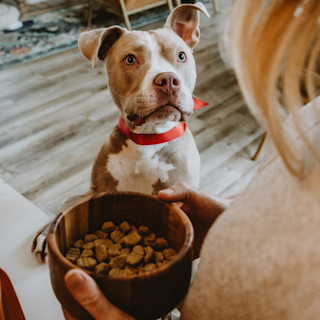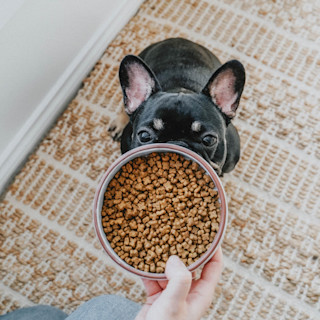February 20, 2025
Can High-Protein Dog Food Cause Diarrhea?

Let’s face it, when it comes to our dogs’ health, the consistency of their poop is something we all keep an eye on. That’s because stool quality can be a good indicator for how our dog’s digestion is doing, and a change could mean there’s something we need to address. It’s not uncommon for a change in your dog’s food to cause an upset tummy or diarrhea, but what about too much protein?
Can Too Much Protein in Dog Food Cause Diarrhea?
There is research that suggests excess protein in dog food can be associated with reduced stool quality, including diarrhea6,8, but the full answer is more nuanced. Whether this is the cause of your dog’s diarrhea depends on a number of factors.
Dietary protein in excess of what dogs need may lead to increased protein fermentation in the gut. This can create metabolites which can result in your dog having more frequent and smellier gas3, or impact inflammation and kidney function2.
Research has also shown that too much protein in a dog's diet can lower the pH in their gut, creating an environment where unfriendly bacteria can thrive8, which can upset the good bacteria, and disrupt a healthy gut microbiome.
Is High-Protein Good for Dogs?
In recent years, it's been well documented that the population of gut bacteria differs between dogs fed high-protein diets versus a moderate-protein diet2,5. Interestingly, large breed dogs may be more susceptible to the potential side effects of high-protein diets than smaller dogs, as they tend to have poorer stool quality in general7.
In short, too much protein has been associated with diarrhea and upset the gut bacteria and reduce pH in the gut of dogs, but the long-term implications of high-protein diets are still not fully known and require more research.
It's clear that more does not always equal better. In fact, when a dog is fed a high-quality protein diet, less total protein is required. In nutrition terms, high-quality protein means that the protein source closely matches what a particular species needs. For example, chicken is a high-quality protein for cats, but not for horses. High-quality protein is also highly digestible to the intended species, making it a better source of protein and amino acids for the body to use1.
High quality proteins for dogs include fresh meats, poultry and fish, along with the ‘perfect protein’, eggs. Although no optimal ranges for healthy dogs are established, AAFCO states that adult dogs need a minimum of 18% on a dry matter basis, however, we also know an individual pet’s protein requirement will vary throughout their life, based on multiple factors including breed and lifestyle.

Our Recommendation
Premium Dog Food with Moderate Protein
Crafted with moderate protein levels from high quality sources like fresh turkey, salmon and duck, and wholesome eggs. Each recipe is perfectly balanced to your dog’s life stage and breed size.
View dog foodAre There Proteins to Avoid?
Whether you should avoid certain proteins for your dog depends on whether your dog has any intolerances. In dogs, beef and chicken are the two of the most commonly documented proteins associated with food intolerances4.

Our Recommendation
Chicken-Free Dog Food Recipes
Is your pup's stomach a little on the sensitive side? Choosing a chicken-free dog food recipe could be the answer. Crafted with high-quality alternative proteins, including salmon, lamb, turkey, or pork.
View chicken-free dog foodHow To Introduce a New Protein to Your Dog’s Diet
When introducing a new food to your dog, whether a dry diet, wet food or topper, we always recommend a minimum 10-day transition in order to allow time for your dog’s digestive system to adjust to the change. Some dogs can be extra sensitive and may even require longer. If at any time during this transition, you notice your dog is experiencing digestive upset, we recommend slowing down this transition.
What Is the Cure for Dog Diarrhea?
Many at-home remedies exist for addressing diarrhea, from feeding a bland rice-and-protein diet to supplementing fibrous canned pure pumpkin, but diarrhea is a symptom, not a disease, and there are many underlying reasons which can result in loose stools, and all may have different therapies. Plus, chronic diarrhea can contribute to dehydration and nutritional imbalances, so we always recommend consulting with your vet for their management recommendations and to help address the root cause.
The Proof Is in the Pile
Your pup’s poop can say so much about their health, and a good stool can be an indicator of digestive and overall health. When dogs experience diarrhea or loose stools, diet may be a factor. High-protein diets can affect stool quality for a number of reasons, but ultimately a dog’s individual sensitivity and unique requirements are the greatest factors. Digestive health is key to overall health, and this can be supported by a balanced diet with fiber, good quality fats, and high-quality protein.
Elliot, D. 2006. Nutritional management of chronic renal disease in dogs and cats. Veterinary clinics: Small animal practice. Vol 36 (6).
Ephraim, E., Cochrane, C., & Jewell, D. 2020. Varying protein levels influence metabolomics and the gut microbiome in healthy adult dogs. Toxins. Vol 12(8).
Hughes., R, Magee., EA,& Bingham., S. 2000. Protein degradation in the large intestine: relevance to colorectal cancer. Current issues in Intestinal Microbiology. Vol 1(2).
Mueller, R.S., Olivry, T., & Prélaud, P. 2016. Critically appraised topic on adverse food reactions of companion animals (2): common food allergen sources in dogs and cats. BMC veterinary research. Vol 12 (9).
Pilla, R., & Suchodolski, J. 2021. The gut microbiome of dogs and cats, and the influence of diet. Veterinary clinics: small animal practice. Vol 51(3).
Volkmann, M., Steiner, J.M., Fosgate, G.T., Zentek, J., Hartmann, s., & Kohn, B. 2017. Chronic diarrhea in dogs- retrospectives study in 136 cases. Journal of veterinary internal medicine.
Weber, M.P., Biourge, V.C., & Mguyen, P.G. 2017. Digestive sensitivity varies according to size of dogs: a review. Animal physiology and animal nutrition. Vol 101 (1).
Zentek, J. 1995. Influence of diet composition on the microbial activity in the gastro-intestinal tract of dogs. I. Effects of varying protein intake on the composition of the ileum chyme and the faeces. Animal physiology and animal nutrition. Vol 74 (1-5).



